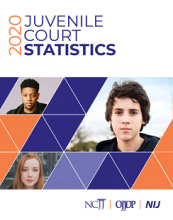Probation
Operationalizing the Individual versus Group Fairness Dichotomy for Recidivism Risk Assessment: US Legal Challenges and Technical Proposals
Mental Health in the Criminal Justice System-The Effect of Mandating Treatment for Convicted Individuals
Juvenile Court Statistics, 2020
Imperfect Tools: A Research Note on Developing, Applying, and Increasing Understanding of Criminal Justice Risk Assessments
Fostering Diversity in a Police Agency, From Bottom to Top
Rethinking revocations: A study to examine the effects of a coaching model on improving outcomes
Community Supervision in a Digital World: Challenges and Opportunities
Enhancing Supervision and Support for Released Prisoners
TECHBeat, Fall 2010
Hawaii's Swift and Sure Probation
Taking Stock: An Overview of NIJ's Reentry Research Portfolio and Assessing the Impact of the Pandemic on Reentry Research
Over several decades, the National Institute of Justice (NIJ) has made significant contributions to the field of reentry, specifically what works for whom and when. In recent years, however, the global pandemic has made it increasingly difficult to conduct research on and with populations involved with the justice system. During this time, many researchers assessing various justice-related outcomes were unable to continue their inquiries as planned due to a lack of access to their populations of interest, forcing many to pivot and rethink their research designs.
See the YouTube Terms of Service and Google Privacy Policy
NIJ FY22 Design, Implementation, and Testing of a National Model for Technical Violations
Booker and Beyond Analyzing Sentencing Reform and Exploring New Research Directions
This webinar features a discussion of previously published research on the U.S. Supreme Court’s 2005 Booker decision - which effectively transformed the United States Sentencing Guidelines from a mandatory, to an advisory, system. The presentation will address selected research findings from the last 15 years. Individual participants will briefly review their previous research findings with particular attention paid to the analytic methods used.
See the YouTube Terms of Service and Google Privacy Policy
Desistance From Crime: Implications for Research, Policy, and Practice
Most scholars would agree that desistance from crime – the process of ceasing engagement in criminal activities – is normative. However, there is variability in the literature regarding the definition and measurement of desistance, the signals of desistance, the age at which desistance begins, and the underlying mechanisms that lead to desistance. Even with considerable advances in the theoretical understanding of desistance from crime, there remain critical gaps between research and the application of that research to practice.
See the YouTube Terms of Service and Google Privacy Policy
The Implementation of the honest opportunity probation with enforcement demonstration field experiment: experiences from the field
Law Enforcement Activities of Philadelphia's Group Violence Intervention: An Examination of Arrest, Case Processing, and Probation Levers
Neighborhood Risk Factors for Recidivism: For Whom do they Matter?
Effectiveness of a social problem solving training in youth in detention or on probation: An RCT and pre-post community implementation
Crime and Desistance: Probing How Probationers' Thoughts on Crime May Inform Their Conduct
Researchers counsel caution on interpreting probationer cognitions — thoughts and thought patterns — as predictors of desistance from crime.
Education versus Punishment? Silo Effects and the School-to-prison Pipeline
Corrections Statistical Analysis Tool (CSAT) - Probation (Bureau of Justice Statistics)
This dynamic analysis tool allows you to examine data collected by BJS's Annual Probation Survey on all adults, regardless of conviction status, who have been placed under the supervision of a probation agency as part of a court order.
Annual Probation Survey and Annual Parole Survey (Bureau of Justice Statistics)
Collect administrative data from probation and parole agencies in the United States. Data collected include the total number of adults on state and federal probation and parole on January 1 and December 31 of each year, the number of adults entering and exiting probation and parole supervision each year, and the characteristics of adults under the supervision of probation and parole agencies. Published data include...
Recidivism Survey of Felons on Probation (Bureau of Justice Statistics)
The one-time survey provided national estimates of the recidivism rate of felons sentenced to probation in selected years. In the survey, samples of convicted felons placed on probation were tracked for three years, and data were compiled on the percentage of them who were are rearrested, reconvicted, or reimprisoned for new crimes within the three-year follow-up period. The various recidivism measures were based on official...


